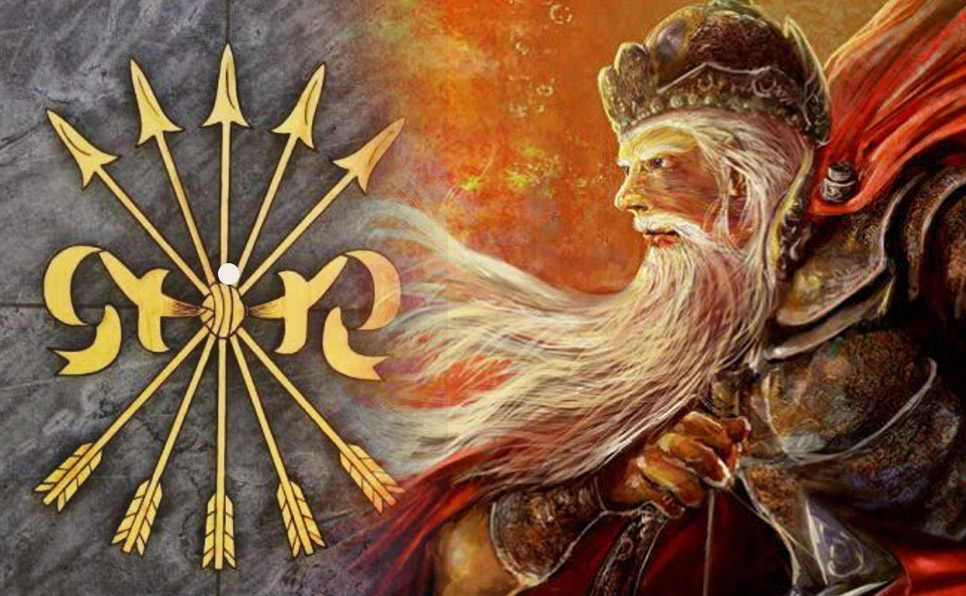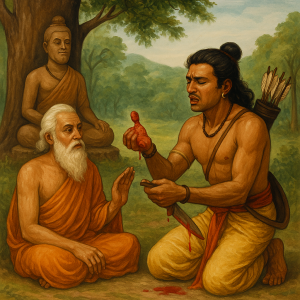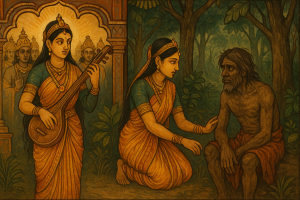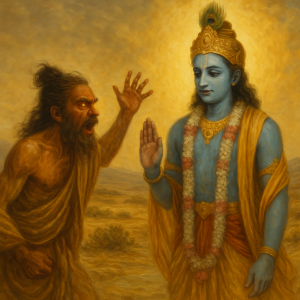In Vaishnava culture, welcoming guests, especially those who enlighten us with spiritual knowledge and inspiration, is a sacred duty. This concept of “Atithi” or the uninvited guest is emphasized throughout the Vedic scriptures, particularly in discussions of the Grihastha ashram (household life). The scriptures repeatedly stress the importance of welcoming, giving hospitality to, and satisfying uninvited guests.
Krishna explains in the Gita that He resides in the heart of every living being (BG 18.61). Therefore, when a guest arrives at our home, we should see them as representatives of God, with God Himself present in their hearts. This understanding should extend even to those who may consider themselves our enemies. Śrīla Prabhupāda taught that when one’s worst enemy comes to your house, you should treat them with such affection and welcome them with such genuine enthusiasm that, at least momentarily, they forget that you are their enemy.
The Example of Duryodhana and the Pandavas
A prime example of this principle is found in the Mahabharata, during the Kurukshetra war. On the seventh day of the war, the Pandavas, particularly Bhima and Arjuna, inflicted significant damage on the Kuru army. Duryodhana, beaten down and bloody from his confrontation with Bhima, went to the tent of his close friend Karna, seeking his support. Karna, who had been sidelined due to Bhishma’s influence, was eager to join the battle and vowed to kill the Pandavas if given the chance. However, Bhishma, aware of Karna’s true identity as the Pandavas’ brother, was reluctant to allow him to fight.
When Duryodhana approached Bhishma, he was nursing his wounds, both physical and emotional. Bhishma, seeing Duryodhana’s condition, treated him with special herbs, relieving him of his pain. Duryodhana, however, began questioning Bhishma’s loyalty, suggesting that Bhishma’s compassion for the Pandavas was preventing him from killing them. Insulted, Bhishma responded with a fierce determination, vowing to kill the Pandavas the next day. He consecrated five special arrows with the power to end their lives, only to have Duryodhana take possession of them for safekeeping.
Krishna’s Omniscience and Arjuna’s Request
Back in the Pandavas’ camp, Krishna, knowing everything as the Supreme Being, warned Arjuna that he and his brothers would die the next day unless they acted. Krishna reminded Arjuna of a promise Duryodhana had made to him long ago when Arjuna had saved Duryodhana’s life from the Gandharvas. Krishna instructed Arjuna to go to Duryodhana and ask for the five arrows.
Despite being in the midst of a war, the cultural etiquette of the time dictated that even enemies were to be treated with respect when they arrived as uninvited guests. Thus, when Arjuna entered Duryodhana’s tent without armor or weapons, Duryodhana welcomed him, offering him a seat and water. When Arjuna asked for the five arrows, Duryodhana, though shocked, honored his promise and handed them over.
The Seriousness of Hospitality and Integrity
This episode underscores the seriousness with which hospitality and integrity were regarded in ancient times. Duryodhana’s adherence to the principle of honoring a guest, despite the consequences, illustrates the deep-rooted values of dharma that even the most hardened warriors upheld. The concept of serving the uninvited guest with love and respect, regardless of their identity or intentions, was integral to maintaining the moral fabric of society.
Lessons to Be Learned
- Stewardship of God’s Property:
- Recognizing that everything belongs to God changes our perspective on how we use our resources. We are merely stewards of what has been entrusted to us, and our duty is to use it in service to others and to God.
- The Sacredness of Hospitality:
- The principle of Atithi Devo Bhava, seeing the guest as a form of God, is deeply embedded in Vedic culture. Treating guests, even enemies, with respect and hospitality is a reflection of true dharma.
- The Power of Integrity:
- The story of Duryodhana and Arjuna demonstrates the importance of maintaining integrity, even in difficult circumstances. Upholding one’s word and treating others with respect are values that transcend enmity and conflict.
- The Omniscience of the Divine:
- Krishna’s knowledge of all things, past, present, and future, serves as a reminder that the Divine is always aware of our circumstances and will guide us if we remain devoted and attentive.
Prayer for Wisdom and Integrity
O Supreme Lord Krishna, the source of all creation, We bow before You, seeking Your guidance and wisdom.
May we always remember that everything belongs to You, And may we use our resources in service to You and all living beings.
Lord, teach us to honor and serve all who come to us, Recognizing Your presence within their hearts, Even when they appear as adversaries.
May we uphold the values of integrity, truth, and hospitality, Following the examples set by the great souls of the past.
Hare Krishna, Hare Krishna, Krishna Krishna, Hare Hare, Hare Rama, Hare Rama, Rama Rama, Hare Hare.
Om Tat Sat.



